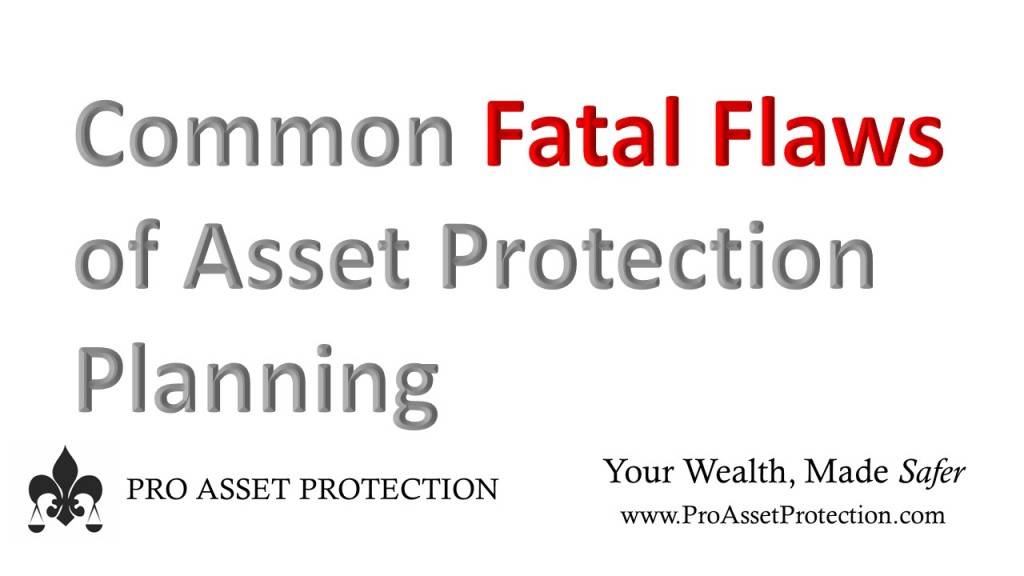 The thing about bad planing is that it tends to stack up, getting bigger and badder with each step. Like waiting too late to act, then doing what you’re not allowed to when you’re not allowed to do it.
The thing about bad planing is that it tends to stack up, getting bigger and badder with each step. Like waiting too late to act, then doing what you’re not allowed to when you’re not allowed to do it.
The Old, “I Don’t Own Anything, My Wife (Kid, Brother, etc.) Owns It All”
We have previously detailed the failures of amateur asset protection planning by both consumers themselves and unskilled lawyers and non-lawyer “promoters”. One of the fatal flaws of asset protection we have covered in detail is a favorite strategy of amateurs that consists of a high liability professional like a physician giving assets to a presumably lower liability spouse, or worse, a child or some other relative. I was recently provided yet another case study on this by Soley V. Soley, an Ohio case(link below) where a doctor did just that, badly.
In the best cases, this is done well in advance of any challenge, in compliance with tax law, formally and may include a post-nuptial agreement or other legal documents that specify ownership and/or a formal transfer of legal title to one spouse etc. as their “separate property” as defined by law.
Most commonly however, it simply involves one spouse putting assets in their spouses name, often under duress or the fear of a lawsuit, and wrongly imagining that this creates some kind of magic barrier that is not reachable or discoverable by the other spouse’s creditors and their personal and professional liability.
In the very worst cases, assets are acquired and titled by an even more remote relative, like a brother, parent etc. and held in “constructive trust”, usually explained by a client as, “My sister owns the LLC we used to buy that building, but we have an understanding that it’s really mine”. I have warned people against this poor planning for 15 years, but most don’t really get it without some specific examples, provided below.
DIVORCE:
A real and legal transfer of assets to a third party means that property is really legally theirs and theirs alone. This means that in a divorce the asset-holding spouse could take all that property in addition to a significant portion of the joint marital estate or half the community property, depending on what state they live in. Simple example: Dr. Judy gives husband Bob $1MM in separate property and leaves $1MM in the marital estate. They get divorced and Bob gets half the martial property, $500K, plus the $1MM she validly transferred to him in the past, leaving her with the short end of a 25/75% split.
THEIR OWN LIABILITY
A transfer of assets to a spouse still leaves the assets subject to that spouse’s personal and professional liability including lawsuits, accidents, bankruptcy, etc. So if Bob gets in a car accident and owns a significant portion of the assets, those assets are exposed to his liability. He may not have had Dr. Judy’s high level of professional liability as a doctor, but he still had his own unique liability. Similarly, if you transfer to your adult child or another relative, the assets may also be at risk to their potential future divorce, child support obligations, bankruptcy, lawsuits, etc.
DEATH
If these person to whom you transfer the assets dies, your assets are part of their estate. While they can direct that those assets come back to you in their estate plan, they usually retain the discretion to amend their estate plan otherwise during their life without your knowledge or consent. This includes your spouse, who has a legal right to dispose of their separate property any way they wish. In the worst of these examples, we’ve seen one party holding property for a non-spouse die and their surviving spouse and children easily fight and win over the person who transferred the assets and who typically had no legally enforceable documents that would allow them to “reclaim” their assets. In other cases the straw man holding the assets for a friend or relative never updates their own estate plan to allow for this transfer back, or they have no estate plan at all and the state decides who gets the assets; their spouse and children will almost always have priority over you.
THEFT AND CONVERSION
If they hold title they can dispose of, sell, encumber and waste assets any way they see fit. I have seen liquid assets depleted through personal spending, lost to poor investments and just plain stolen by the person holding them. No harm, no foul however, because you made them the legal “owner” you gave them every right to do so.
MORE READING:


2 thoughts on “Why Giving Assets To Spouse, Relatives Isn’t Asset Protection”
Interesting Blog!
Can we share your blog on our Social media channels?
Sure, thanks for reaching out. As long as it is attributed we have no issue, we also work closely with other lawyers nationally.
Comments are closed.